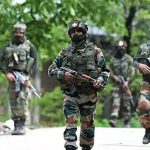Originally Published at : https://www.firstpost.com/opinion/pakistans-military-muscle-torn-by-overuse-strained-by-discord-13873778.html
Once the most trusted institution in the nation, the military now struggles with declining morale, internal fractures, and intensifying public backlash
The Pakistani military, historically considered the bedrock of the nation’s political and social stability—exemplified by its self-claimed ‘swift mobilisation’ during national crises such as the Indo-Pakistani wars of 1965 and 1971, relief operations following natural disasters, and its pivotal role in establishing national unity during times of internal discord—is currently navigating through one of its most profound crises, reminiscent of an overtrained gym freak: dangerously weakened due to chronic misuse and internal turmoil. Once the most trusted institution in the nation, the military now struggles with declining morale, internal fractures, and intensifying public backlash.
Since its establishment in 1947, the Pakistan Army has positioned itself as the guardian of the country’s ideological and territorial integrity, notably through pivotal events such as the wars with India in 1965 and 1971 and despite its controversial role and eventual loss in the Bangladesh Liberation War.
However, its frequent forays into governance, either through direct military coups—such as those led by Generals Ayub Khan, Zia-ul-Haq, and Pervez Musharraf—or indirect influence on civilian politics, have gradually diminished public trust and institutional credibility. Initially justified as necessary interventions to maintain national security and order, the military’s political ambitions have now turned into chronic overreach, alienating both the public and the rank and file.
This erosion of credibility has notably accelerated in recent years, particularly following the tumultuous tenure and ouster of former Prime Minister Imran Khan. The intense rivalry between Khan and Army Chief General Asim Munir has exacerbated existing institutional rifts, revealing unprecedented internal divisions within the military. Khan was once considered the military’s chosen candidate but fell out of favour due to differences over economic governance, foreign policy, particularly relations with the United States, and Khan’s attempts to assert greater civilian control over military appointments. His contentious removal from office in April 2022 triggered widespread civil unrest and demonstrations, reflecting significant public disapproval of military-political interference.
Historically known for their adherence to command, junior officers within the army have reportedly begun voicing dissatisfaction over leadership decisions, a development once considered unimaginable within the strictly hierarchical military structure. Leaked letters and credible social media reports indicate a serious decline in morale, driven by perceptions of corruption, political manipulation, and operational incompetence at senior-most levels.
For instance, recent controversies involving financial irregularities and allegations of nepotism within senior ranks have exacerbated dissatisfaction among younger officers. Such internal dissent poses a significant threat to the military’s cohesion, which is essential for maintaining an effective command structure.
Externally, the military faces escalating public criticism and open defiance, fuelled mainly by widespread social media activism. Empowered by digital platforms, civil society now vigorously challenges the army’s traditional narratives. The longstanding portrayal of India as the existential enemy, once a reliable justification for the military’s outsized role in national affairs, has begun to unravel in the face of growing public scepticism. Increasing numbers of Pakistanis now question the validity of this threat, perceiving it instead as a diversionary tactic employed by the military to justify its control over political and economic resources.
The 2024 general elections underscored this shifting sentiment. Despite heavy-handed efforts by the military establishment to sideline Imran Khan and his party, Pakistan Tehreek-e-Insaf (PTI), independent candidates aligned with PTI won substantial support, signalling a clear public repudiation of military interference. These elections were characterised by significant restrictions, crackdowns on political activists, and systematic intimidation, yet voters remained defiant, delivering a potent message against the military’s political meddling.
Moreover, Pakistan’s deteriorating security landscape compounds these internal issues. Groups such as Tehrik-i-Taliban Pakistan (TTP) and the Balochistan Liberation Army (BLA) have dramatically intensified their insurgency campaigns, significantly undermining the military’s operational strategies. Regions traditionally viewed as secure military bastions, particularly Punjab and Khyber Pakhtunkhwa, now witness regular attacks, challenging the army’s claim to be the ultimate protector of national security.
For instance, recent high-profile attacks on military installations and convoys have raised serious questions about preparedness and counterterrorism efficacy. The insurgencies have been exacerbated by policy missteps and counterproductive military tactics, notably forced disappearances and extrajudicial killings in Balochistan, inflaming rather than containing insurgencies.
The Taliban’s return to power in Afghanistan has added yet another complex layer to Pakistan’s security dilemma. Despite Pakistan’s historical support for the Taliban as a geopolitical counterweight, the group’s ascendancy has emboldened insurgents within Pakistan’s own borders. Critics argue that this is a direct result of strategic miscalculations by Pakistan’s military leadership, which underestimated the repercussions of fostering extremist groups as proxies.
The unprecedented court-martial of Lt Gen Faiz Hameed, former chief of the powerful Inter-Services Intelligence (ISI), further highlights the severity of internal crises. Hameed’s indictment on charges related to political interference underscores how deeply political ambitions have permeated the military’s senior ranks. This incident has significantly damaged the integrity of military leadership, further weakening its moral authority and public credibility.
Today, the Pakistani military stands at a critical juncture, confronted by the cumulative consequences of decades of strategic overreach and political intervention. The once-formidable institution now grapples with significant internal weaknesses and external vulnerabilities. Like a chronically overtrained athlete, the army’s muscles have become sore from misuse, weakened by internal disarray and public resentment.
The Pakistani military urgently requires thorough introspection, structural reforms, and a strategic recalibration. Failure to address these challenges effectively could deepen existing crises, fostering prolonged instability and potentially reshaping Pakistan’s governance structure unpredictably. Restoring internal discipline, regaining public trust, and redefining its role within a genuinely democratic framework are essential for the military to reclaim its effectiveness and relevance in Pakistan’s future.













